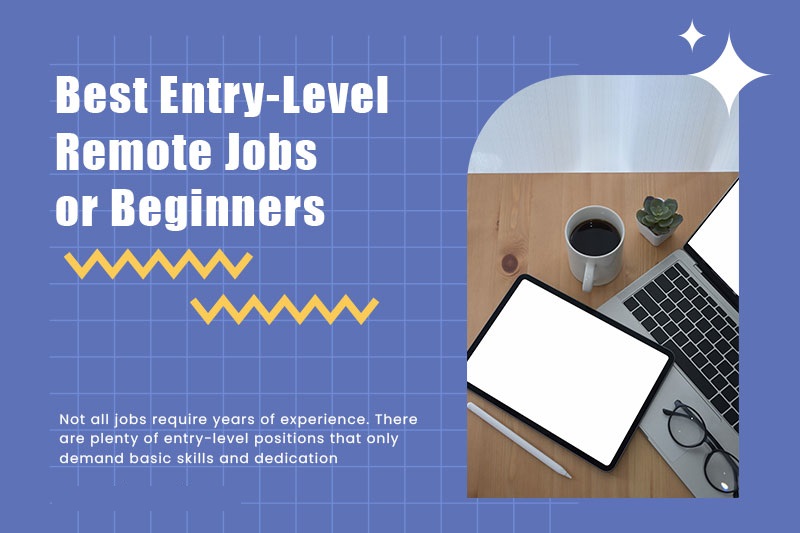In today’s ever-evolving job market, finding a remote job is no longer a dream – it’s a reality for many. But what if you’re just starting out? No worries! There are tons of entry-level remote jobs hiring right now, perfect for those without years of experience. This guide will dive into everything you need to know, whether you’re fresh out of school or looking for a career change.
What Are Entry-Level Remote Jobs?
An entry-level remote job is a position that requires little to no prior experience, offering a starting point in a new career, but with the added benefit of working from anywhere. These roles often focus on foundational skills, allowing you to learn and grow while on the job. It’s like stepping onto the first rung of a career ladder, but instead of commuting, you’re working from your couch!
Why Choose Remote Entry-Level Jobs?
Remote work is booming for a reason. For beginners, it offers several unique benefits:
Flexibility: Work from anywhere, anytime.
Work-life balance: You can design a schedule that suits your personal life.
Growth potential: Many entry-level jobs lead to more advanced roles over time.
Cost-effective: No commuting means saving on time and travel expenses.
Top Industries Hiring for Entry-Level Remote Jobs
If you’re wondering where to look, certain industries are more remote-friendly than others. Here’s a breakdown of some of the leading sectors hiring entry-level positions.
1. Customer Service
Customer service is one of the most popular entry-level remote job sectors. All you need is a good internet connection, a pleasant attitude, and problem-solving skills.
Roles to look out for: Customer Service Representative, Help Desk Support.
Skills needed: Communication, empathy, patience.
2. Data Entry
For those who are detail-oriented, data entry could be a great starting point. You’ll input data into systems, ensuring everything runs smoothly.
Roles to look out for: Data Entry Clerk, Typist.
Skills needed: Typing speed, attention to detail, organization.
3. Virtual Assistant
Virtual assistants help businesses with various administrative tasks, from scheduling appointments to managing emails.
Roles to look out for: Administrative Assistant, Virtual Office Assistant.
Skills needed: Organization, multitasking, time management.
4. Content Writing
Are you good with words? Many companies hire entry-level writers to create blog posts, articles, and other forms of content.
Roles to look out for: Content Writer, Copywriter.
Skills needed: Writing, research, creativity.
5. Social Media Management
If you’re always online and know your way around social media platforms, this could be your calling. Companies are looking for people to manage their online presence.
Roles to look out for: Social Media Coordinator, Digital Marketing Assistant.
Skills needed: Creativity, trend awareness, communication.
6. Tech Support
Even if you’re not a tech guru, many companies provide training for entry-level tech support roles.
Roles to look out for: IT Support Technician, Technical Support Representative.
Skills needed: Basic troubleshooting, communication, patience.
Key Skills Employers Look for in Remote Entry-Level Jobs
While you might not need years of experience, there are certain skills that can make you stand out in your application.
1. Communication
Since you won’t be in the office, the ability to communicate effectively through email, chat, and video calls is crucial.
2. Time Management
Remote work requires self-discipline. Employers want to know you can manage your time without constant supervision.
3. Problem-Solving
Whether it’s dealing with a tricky customer or troubleshooting a tech issue, problem-solving skills are always in demand.
4. Adaptability
Remote work environments can change quickly, and being adaptable means you can handle new challenges with ease.
How to Find Entry-Level Remote Jobs
So, where exactly do you find these opportunities? Luckily, the internet has made job searching easier than ever. Here’s where to start.
1. Job Boards
There are numerous job boards dedicated specifically to remote work. Websites like Remote.co, We Work Remotely, and FlexJobs list a wide variety of entry-level positions.
Tip: Filter jobs by “Entry-Level” to find the right fit for your experience.
2. Company Career Pages
Some companies, especially in tech, hire remote workers directly through their own websites. Keep an eye on the career pages of companies you’re interested in.
3. Networking
Networking isn’t just for in-person events. Online communities and platforms like LinkedIn are excellent for connecting with potential employers and staying updated on job openings.
Creating a Standout Remote Job Application
Even if you’re new to the remote work world, a strong application can help you land that first job. Here’s how to make your resume and cover letter shine.
1. Tailor Your Resume
Customize your resume for each job you apply to, highlighting relevant skills and experiences, even if they come from non-traditional work environments.
2. Showcase Remote Skills
Even if you haven’t worked remotely before, emphasize any experiences that required self-discipline, organization, or independent problem-solving.
3. Nail the Cover Letter
Your cover letter is your chance to show why you’re a great fit. Highlight your passion for remote work and your eagerness to learn.
Preparing for a Remote Job Interview
Once you’ve landed an interview, it’s time to prepare. Remote job interviews are often conducted via video call, so here’s how to get ready.
1. Set Up a Professional Space
Even though it’s a remote interview, your environment matters. Choose a quiet, tidy space where you won’t be interrupted.
2. Test Your Tech
Make sure your internet connection is stable, and that your microphone and camera work properly. The last thing you want is a tech glitch during the interview.
3. Prepare for Common Questions
Just like any job interview, be ready to answer questions about your skills, experience, and why you want the job. Be prepared to explain why you want to work remotely and how you’ll manage your time effectively.
Companies Actively Hiring for Entry-Level Remote Jobs
Here are a few companies that regularly offer remote entry-level opportunities. Keep an eye on their websites for new listings.
1. Amazon
The retail giant often hires remote customer service representatives and tech support agents for entry-level positions.
2. Upwork
If freelancing appeals to you, Upwork is a platform where businesses post gigs for various services, from writing to administrative work.
3. Rev
Rev is known for offering transcription and captioning jobs that you can do from home. It’s a great place to start if you’re a fast typist.
4. Appen
Appen hires remote workers for a variety of roles, including social media evaluators and data collectors, often requiring minimal experience.
5. Concentrix
This global company hires remote workers for customer service positions, providing training for those new to the industry.
The Future of Remote Work for Entry-Level Jobs
The future looks bright for remote work, especially at the entry-level. As companies continue to adapt to a digital world, more opportunities are opening up for remote positions across various industries.
1. Growing Demand
With more businesses embracing remote work, the demand for remote employees – even at the entry level – is only increasing.
2. Career Advancement
Many entry-level remote positions have pathways to promotion, so starting in a junior role doesn’t mean you’ll stay there forever.
3. Global Opportunities
Remote work means you’re not limited to your local job market. You can apply for positions anywhere in the world, giving you access to a much broader range of opportunities.
Conclusion
Landing an entry-level remote job can be your ticket to a flexible, rewarding career. Whether you’re drawn to customer service, data entry, or content creation, there are countless opportunities waiting for you. The key is to start looking, tailor your application, and confidently step into the remote work world. Who knows? Your dream job could be just a click away.
FAQs
What qualifications do I need for an entry-level remote job?
Most entry-level remote jobs require basic skills like communication, time management, and adaptability rather than specific qualifications.
Can I work remotely with no experience?
Yes! Many remote jobs are specifically designed for beginners and offer on-the-job training.
How much can I earn in an entry-level remote position?
Salaries vary by industry and role, but most entry-level remote jobs offer competitive pay for beginners.
What are the best websites to find remote jobs?
Websites like FlexJobs, Remote.co, and We Work Remotely are great starting points for remote job seekers.
Is remote work here to stay?
Absolutely! The shift toward remote work is continuing, with more companies offering flexible, location-independent roles than ever before






